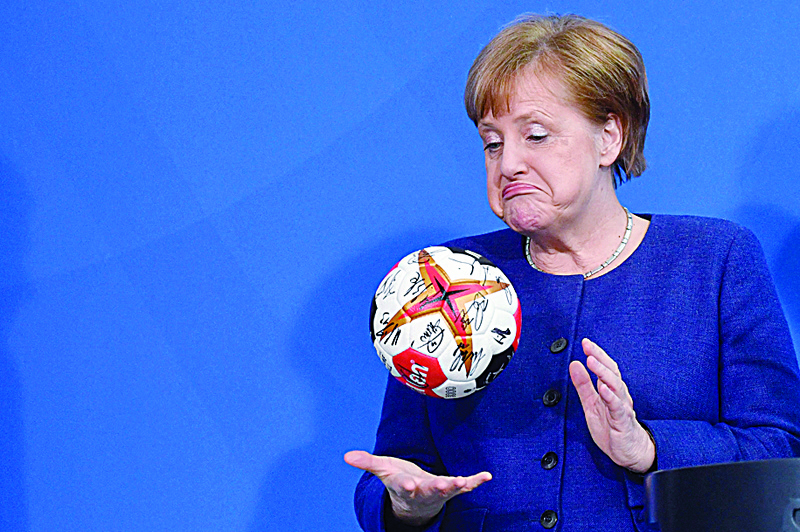 BERLIN: German Chancellor Angela Merkel plays with a handball given to her by the German Handball Federation's president (not in picture) as she received the German national handball team at the Chancellery in Berlin. - AFP
BERLIN: German Chancellor Angela Merkel plays with a handball given to her by the German Handball Federation's president (not in picture) as she received the German national handball team at the Chancellery in Berlin. - AFP
BRUSSELS: Angela Merkel's exit from the stage is sparking fears of a hole at the heart of the European Union during challenging times - but there are also hopes for a wind of change. Tributes have been growing for the German leader - dubbed "Queen of Europe" by some observers after 16 years as chancellor - ahead of elections this weekend to choose a successor. Dutch Prime Minister Mark Rutte praised Merkel's "enormous authority" after helping steer Europe through years of turbulence that included the financial crisis, migrant crisis, Brexit and the coronavirus pandemic.
European Commission chief Ursula von der Leyen, who served under Merkel as German defense minister, underscored how important the former physicist's analytical skills had been for unlocking interminable EU negotiations. "She can always put things in the context of the many years in Europe she helped to shape," von der Leyen said. "And often, when we've hit an impasse, she'll throw out an idea and then we're moving again. We'll miss that."
Pragmatic manager
"Of course, her departure leaves a void," Janis Emmanouilidis of the European Policy Center told AFP. He called the departure of the EU's longest-serving current leader "the end of an era" for the 27-nation bloc. Few will remember Merkel for any visionary speeches on Europe's future. But it has been her much-touted image as a pragmatic manager that has seen her help to maintain unity inside the EU during a period Emmanouilidis dubbed one of "permanent crisis".
He said she had shown "continuity and firmness", qualities that have made her the pre-eminent leader in Europe. "The next chancellor will first have to gain stature before being able to look to replace her in this role." Merkel's steady hand has seen her carve out a positive reputation across much of the continent. In a survey carried out in 12 EU countries by the European Council on Foreign Relations (ECFR), 41 percent of respondents said they would back Merkel if in a vote for the fictitious role of EU "president".
"Merkel's approach of searching for compromises between competing interests is a major source of Berlin's positive image," the think-tank said. But she has also attracted criticism for her handling of some key challenges. During the eurozone debt crisis of the early 2010s, Merkel was lambasted for the delay in coming to the aid of indebted countries, such as Greece, spurring fears of a collapse of the single currency. She then drew widespread popular ire in Greece for the swingeing conditions imposed on Athens under a bailout.
'Hesitancy'
Former European Commission chief Jean-Claude Juncker hailed Merkel for opening Germany's borders during the 2015 migrant crisis and helping craft a 750 billion-euro rescue plan from the pandemic. But he pushed back at those portraying her as the savior of Europe. "It is the German narrative that would like to present it as if she had been at the origin of all the solutions to these serious crises," Juncker said. "I do not underestimate the role she played, but I am far from overestimating it after having experienced her hesitancy."
Former Spanish foreign minister Ana Palacio in an editorial criticized Merkel's "strategy of waiting for desperate situations to call for desperate measures". She argued that this has "often benefited those who break the rules", such as right-wing Hungarian leader Viktor Orban, accused of dragging his country away from European values.
Merkel departs with the EU facing a raft of historic challenges -- from recovering after the pandemic, to fighting climate change and fashioning a geopolitical role for a Europe caught between the United States and China. "Many of the most pressing challenges Europe faces are impossible to address with the Merkel method," analysts from the ECFR wrote, insisting they require "not only cosmetic changes but political support for more radical solutions". "The EU will need a more visionary and courageous Germany to strengthen its foundations and defend its place in the world." - AFP




